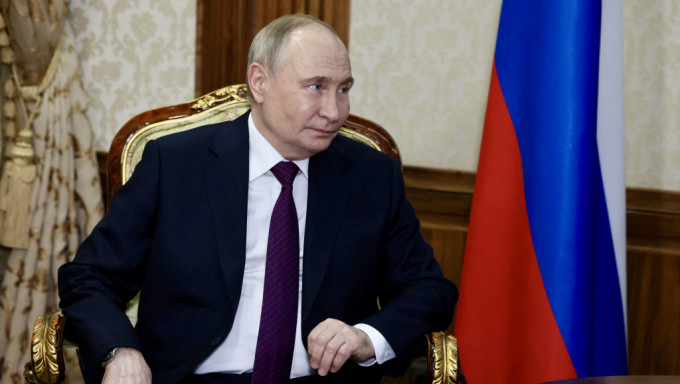Putin Ready to Cease Fire in Ukraine Under Certain Conditions
Russian President Vladimir Putin expresses willingness to negotiate a ceasefire in Ukraine, but demands recognition of current front lines as a prerequisite.
Published May 24, 2024 - 16:05pm

Image recovered from std.stheadline.com
Russian President Vladimir Putin has conveyed a readiness to halt the ongoing military conflict in Ukraine under specific conditions. According to reports from multiple sources close to the Kremlin, Putin seeks a ceasefire arrangement that acknowledges the current front lines of the conflict. The Russian leader has shown frustration towards what he perceives as Western attempts to hinder negotiations and Ukrainian President Volodymyr Zelensky's refusal to engage in talks.
Dmitry Peskov, the Kremlin's spokesperson, reiterated that Russia remains open to dialogue, emphasizing that the country does not want an 'eternal war'. This sentiment was echoed by four Russian insiders who participated in high-level discussions with Putin. They revealed that while Putin is prepared to fight as long as necessary, he is also ready to freeze the conflict at its current state if Kyiv and the West agree to his terms.
The primary contention lies in the recognition of the present territorial lines. Putin believes the gains made so far in the conflict are sufficient to be presented as a victory to the Russian people. A senior source familiar with Kremlin affairs indicated that Putin considers the current momentum adequate to solidify the perception of a Russian triumph without needing further national mobilization, which could incite domestic dissent.
Despite these assertions, Ukrainian officials have not responded to requests for comments. The geopolitical landscape remains complex, with significant reluctance from both Kyiv and Western nations to concede to Putin's conditions. The U.S. Secretary of State, Antony Blinken, during a recent visit to Kyiv, expressed skepticism about Putin's interest in sincere negotiations, underscoring that the Kremlin's actions have not demonstrated a genuine commitment to ending the conflict.
The war, described as the largest land conflict in Europe since World War II, has resulted in substantial casualties and severe economic sanctions on Russia. The continuous aggression and territorial aspirations have left little room for diplomatic resolutions. Analysts suggest that any shift towards a peace agreement would require significant concessions from both sides, which currently seems unlikely given the steadfast positions of the involved parties.
As the war progresses, the humanitarian and economic toll continues to escalate, with no clear end in sight. The international community remains vigilant, hopeful for a diplomatic solution but wary of further escalations that could lead to broader regional instability.
While President Putin has signaled a willingness to explore diplomatic channels, his insistence on maintaining control over the territories Russia currently occupies is a core sticking point. This stance reflects the Kremlin's broader strategic ambitions in the region and serves as a testament to the progress they believe they have made in what they refer to as a "special military operation." Nonetheless, international bodies, including the United Nations, have not recognized any shifts in territorial sovereignty resultant from the conflict, deeming them contrary to international law.
To the broader Russian populace, the Kremlin has framed the conflict as a defensive rather than aggressive act, asserting that the military operations are necessary for the nation's security and the protection of the Russian-speaking population in Ukraine. However, this narrative is complicated by the significant loss of life and the economic hardship that has stemmed from international sanctions. The Russian economy is facing significant challenges, including inflation, a depreciated ruble, and the exodus of foreign businesses.
On the diplomatic front, efforts to initiate peace talks have been met with cynicism, given the ongoing offensive operations on the ground. Foreign diplomats and international mediators express concerns about the sincerity of Moscow's overtures, especially while the humanitarian crisis within Ukraine deepens. Numerous towns and cities have experienced devastating destruction, with civilian casualties mounting and millions displaced both within Ukraine and as refugees abroad.
In Ukraine, the mood remains defiant, with President Zelensky and his government insisting on the complete restoration of the nation's territorial integrity as a pre-condition for any peace negotiations. Ukraine's resolve has been bolstered by military aid and financial support from Western allies, reinforcing their capacity to resist Russian advances. Even as the conflict persists, Ukraine continues its bid for closer ties with the European Union and NATO, which complicates any potential rapprochement with Moscow.
The global ramifications of the conflict are profound, affecting energy markets, prompting food shortages, and straining international relations. The potential for a protracted war, or the introduction of new theaters of conflict, concerns international leaders. World powers are keenly aware of the delicate balance required to maintain peace and prevent the dispute from morphing into a larger, more encompassing war.
In conclusion, while President Putin's proposal of a ceasefire may appear to suggest an opening for diplomacy, the realities on the ground, combined with the stark demands of the Russian leadership, paint a picture of enduring hostilities. The international community continues its search for a pathway to peace that preserves Ukrainian sovereignty, ensures regional stability, and addresses the broader implications of the war that extend well beyond Europe's borders.






